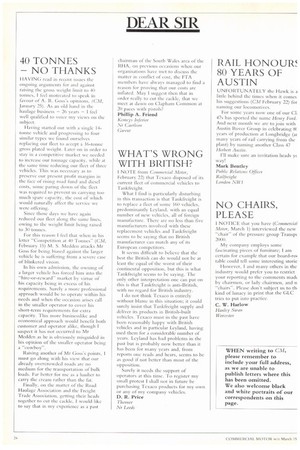40 TONNES NO THANKS
Page 24

If you've noticed an error in this article please click here to report it so we can fix it.
HAVING read in recent issues the ongoing arguments for and against raising the gross weight limit to 40 tonnes, I feel motivated to speak in favour of A. R. Goss's opinions, (CM, _January 25). As an old hand in the haulage business — 26 years — I feel well qualified to voice my views on the subject.
Having started out with a single 14tonne vehicle and progressing to four similar types we found ourselves replacing our fleet to accept a 16-tonne gross plated weight. Later on in order to stay in a competitive market we needed to increase our tonnage capacity, while at the same time reducing our Elect of three vehicles. This was necessary as to preserve our present profit margins in the face of rising road fund and diesel costs, sonic paring down of the fleet was required to prevent us carrying too much spare capacity, the cost of which would naturally affect the service we were offering.
Since those days we have again reduced our fleet along the same lines, owing to the weight limit being raised to 30 tonnes.
For this reason I feel that when in his letter "Competition at 40 Tonnes" (CM, February 15) M. S. Medden attacks Mr Goss for being biased against the larger vehicle he is suffering from a severe case of blinkered vision.
In his own admission, the owning of a larger vehicle has forced him into the "hire-or-reward" market by virtue of his capacity being in excess of his requirements. Surely a more professional approach would be to operate within his needs and when the occasion arises call in the smaller operator to cover his short-term requirements for extra capacity. This more businesslike and economical approach would benefit both customer and operator alike, though I suspect it has not occurred to Mr Medden as he is obviously misguided in his opinion of the smaller operator being a "cowboy".
Raising another of Mr Goss's points, I must go along with his view that our already overcrowded roads are no medium for the transportation of hulk loads. Far better for me as a haulier to carry the cream rather than the fat.
Finally, on the matter of the Road Haulage Association and the Freight Trade Association, getting their heads together to cut the cackle, I would like to say that in my experience as a past
chairman of die South Wales area of the RHA. on previous occasions when our organisations have met to discuss the matter in conflict of cost, the FTA members have always managed to find a reason for proving that our costs arc inflated. May I suggest then that in order really to cut the cackle, that we meet at dawn on Clapham Common at 20 paces with pistols?
Phillip A. Friend Kemeys Inferior Nr Caerleon Gwent




















































